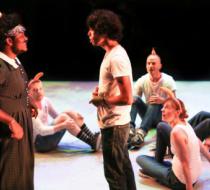The T Party Favorite
Even if the idea of interactive theater gives you hives, you can still find amusement, and perhaps enlightenment, at Forum Theatre’s “The T Party,” a bold and inventive exploration of gender identity by local writer-director Natsu Onoda Power. The play begins as a progressive party you’ll be encouraged to join, but fear not. You can remain a mere observer.
You can watch as other audience members indulge in a little pre-show karaoke, or skip having your photo taken and simply enter the darkened hallway leading into the theater, pausing briefly to take in a cute inflatable-dolphin exhibit. To avoid being drawn onstage to dance the Electric Slide with the partyers at the Forum High “prom,” you might do well to head for the higher seats.
Late in this loosely structured first act, a young man shows up at the prom to find his ex-girlfriend dancing with a girl. His ex tells him she’s just going through a “phase,” but he gets obstreperous. Soon after, “The T Party” reassembles itself, transforming from a sort-of “happening” into a sort-of play, which is based, according to Forum, on “real and local stories.”
In the first of eight semi-related scripted scenes, a man (Jonathan Feuer) and a female friend (Rachel Hynes) text each other aloud, punctuation and smiley faces included. Their sexual orientations are not wholly clear, but he likes dressing in women’s clothing and wants to meet women who like that in a man. “I wish more women were interested in girls like me,” he says with a sigh.
Confused yet? By the end of “The T Party,” most variations on the gender-identity spectrum will be sorted out, more or less.
Rafael Sebastian in “The T Party” at Forum Theatre. (Noe Todorovich Photography)
Power (“Astro Boy”) throws the ensemble headlong through a variety of encounters, from comic to surreal to poignant. She pulls apart the colors of the gender-identity rainbow, explicates them, then pretty successfully puts the rainbow back together. Throughout, she makes the subject a grown-up conversation full of wit and pop. (A briefly somber epilogue warns of the high rate of suicide and suicide attempts among transgender people.)
The playwright uses dialogue, rap, dance and even whimsical zoological parallels to sketch the lives of those who fall within the ever-widening range of gender identities.
Ballroom dance weaves through an emotional scene called “Une Femme et Une Femme,” about two college girls (Sara Dabney Tisdale and Allie Villarreal) who fall in love, then separate after becoming targets of anti-gay harassment. In one of the funniest bits, “Non Binary Sex Education for Kids,” actor Nehemiah Markos, who also is the show’s charmer of a narrator, dons a frumpy kindergarten-teacher dress and answers kids’ questions about where babies come from. His up-to-date yet comically euphemistic answers are a riot.
A happily transgender woman (Rafael Sebastian) shares her experience with a naive occasional cross-dresser (Brendan Quinn), who still identifies as a man. This encounter, titled “Long Island Iced T,” provides a sharp view of the expanding glossary of accepted terms to describe gender.
The audience sits above the stage, which Power takes advantage of by decorating the stage floor with whimsical projections, animations and color. This certainly enhances the mini-lecture on “Socio-Sexual Behavior and the Development of Male-Male Bonds Among Indian Ocean Bottlenose Dolphins,” in which actors in pale unitards “swim” atop the watery images.
Not every scene packs equal punch. One set in a Dupont Circle club imagined as a many-gendered animal sanctuary doesn’t quite jell, and a rendition of “One” from “A Chorus Line” lacks pizzazz. But the show, first presented by Forum as a workshop in 2013, is strong enough in its current form to absorb flaws and fully engage an audience.


